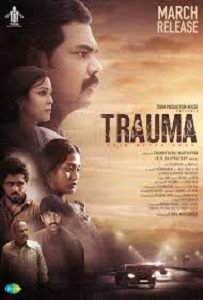Trauma Movie Review: A Gripping Medical Mafia Thriller That Justifies Its Name.Filmygod
A Promising Premise That Fails to Deliver
Director Thambidurai Mariyappan’s Trauma sets out with an intriguing premise, exploring the dark underbelly of medical malpractice and the emotional turmoil of childlessness. The film attempts to weave multiple storylines together, but instead of creating an engaging hyperlink narrative, it ends up feeling disjointed and unconvincing. Despite its potential to be a hard-hitting thriller, Trauma loses focus and stumbles over its own misplaced storytelling choices.
A Muddled Hyperlink Narrative
Trauma begins with the police discovering a corpse during a routine vehicle check. The film then rewinds to the past, introducing us to two central storylines: the struggles of a childless couple, Sundar (Vivek Prasanna) and his wife Geetha (Chandini Tamilarasan), and the tumultuous relationship between lovers Selvi (Poornima Ravi) and Jeeva (Prathosh). These parallel narratives supposedly connect through a larger crime, but their intersection is superficial at best.
Rather than seamlessly blending the storylines, the film awkwardly shifts between them, often without logical or emotional coherence. The characters from different arcs barely cross paths in a meaningful way, making the hyperlink concept feel more like a gimmick than a carefully structured narrative device. Had the film focused on a single compelling story—such as a couple’s battle against a corrupt medical mafia—it might have been far more gripping.
Logical Gaps and Inconsistent Police Work
One of the most glaring issues with Trauma is its numerous logical inconsistencies. The most jarring of these is the decision to conduct final rites for a corpse found under suspicious circumstances. In reality, no burial or cremation would take place without a proper autopsy and investigation. Such oversights make it difficult for the audience to take the film’s murder mystery elements seriously.
Additionally, a crucial scene involves a police investigation where officers fail to recognize a portrait of chess grandmaster Viswanathan Anand—an individual instantly identifiable to most people. This unnecessary lapse is a forced excuse to propel the investigation forward with a clumsy exposition dump about an unrelated Japanese myth. Even the police procedures feel half-baked, with key moments—such as an identification parade—being treated in an unintentionally comedic manner. The result is a film that struggles to establish a credible investigative tone.
Weak Character Arcs and Forced Humor
One of Trauma’s biggest weaknesses lies in its underdeveloped characters. Sundar, who desperately wants a child, is written with a singular obsession that defines his entire personality. Every conversation he has circles back to his inability to become a father, making his character exhausting rather than sympathetic. His wife, Geetha, fares no better—she exists only to echo her husband’s frustrations, without any personal depth or emotional evolution.
Similarly, Selvi’s motivations appear inconsistent. She chases after Jeeva with the hope of securing a better future for her father, yet her actions often contradict her supposed ambitions. Had her arc been better developed, it could have added an emotionally compelling layer to the film.
The film also struggles with tonal inconsistencies, particularly in its misplaced comedic sequences. Instead of seamlessly integrating humor, Trauma inserts forced, unfunny moments that disrupt the tension rather than complement it. A key moment leading up to the interval, in which the police foolishly lose custody of two comically incompetent robbers, completely undermines any sense of urgency. The inconsistent tone leaves the audience unsure of how seriously to take the film.
A Predictable Climax and Missed Opportunities
Trauma attempts to keep viewers engaged with plot twists, but the climactic revelation is disappointingly predictable. Any attentive viewer can see it coming from a mile away, and rather than delivering a satisfying payoff, the film limps towards an anticlimactic ending that feels unearned. The attempt at leaving room for a sequel with a final “wink at the camera” moment only highlights the lack of closure rather than building anticipation for a potential follow-up.
Another missed opportunity is the film’s brief mention of adoption. Inspector Ajay Kumar (Sanjeev) makes a valid point about how adopting an orphan could be a more meaningful solution than spending a fortune on fertility treatments. Unfortunately, this thought-provoking idea is never explored further. Had the film delved into the emotional dilemmas surrounding adoption versus biological parenthood, it could have added much-needed depth to its narrative.
Final Verdict: A Film That Lacks Focus
Trauma had all the ingredients for a compelling thriller—an intriguing premise, a morally complex theme, and the potential to explore societal issues like medical fraud and infertility struggles. However, poor execution, weak character arcs, and a lack of narrative coherence weigh the film down. Instead of crafting a gripping, emotionally charged drama, Trauma meanders aimlessly, never fully committing to any of its ideas.
If you’re looking for a tense medical mafia thriller, Trauma is unlikely to satisfy. It attempts to be many things at once—a crime investigation, an emotional drama, and a social commentary—but in the end, it doesn’t do justice to any of them. What could have been a thought-provoking film ends up as a frustratingly disjointed experience that leaves little impact.

Leave a Reply